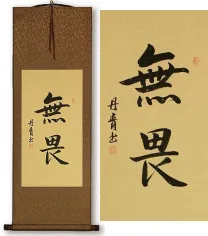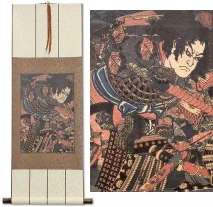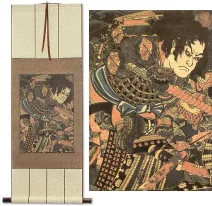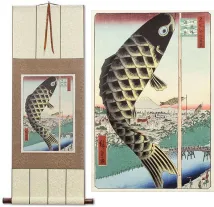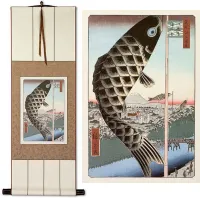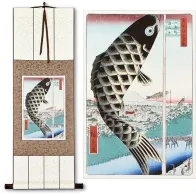Many custom options...
And formats...

No Surrender in Chinese / Japanese...
Buy a No Surrender calligraphy wall scroll here!
Personalize your custom “No Surrender” project by clicking the button next to your favorite “No Surrender” title below...
No Surrender
Honor Does Not Allow Second Thoughts
義無反顧 is a Chinese proverb that can be translated in a few different ways. Here are some examples:
Honor does not allow one to glance back.
Duty-bound not to turn back.
No surrender.
To pursue justice with no second thoughts.
Never surrender your principles.
This proverb is about the courage to do what is right without questioning your decision to take the right and just course.
Honorable Death - No Surrender
This ancient Japanese proverb can be translated as “The principle of honorable death and no surrender,” or simply “No surrender.”
If you directly translate this, you get something that means “Doctrine of suicide,” or “Ideology of honorable death.”
玉砕主義 is a specifically-Japanese proverb that embraces the long history of honorable suicide or self-sacrifice for honor in Japanese culture.
This in-stock artwork might be what you are looking for, and ships right away...
Gallery Price: $108.00
Your Price: $59.88
Gallery Price: $108.00
Your Price: $59.88
Gallery Price: $61.00
Your Price: $33.88
Gallery Price: $61.00
Your Price: $33.88
Gallery Price: $61.00
Your Price: $33.88
Gallery Price: $108.00
Your Price: $59.88
Gallery Price: $90.00
Your Price: $49.88
Gallery Price: $90.00
Your Price: $49.88
Gallery Price: $90.00
Your Price: $49.88
Not the results for no surrender that you were looking for?
Below are some entries from our dictionary that may match your no surrender search...
| Characters If shown, 2nd row is Simp. Chinese |
Pronunciation Romanization |
Simple Dictionary Definition |
玉砕主義 see styles |
gyokusaishugi ぎょくさいしゅぎ |
More info & calligraphy: Honorable Death - No Surrender |
義無反顧 义无反顾 see styles |
yì wú fǎn gù yi4 wu2 fan3 gu4 i wu fan ku |
More info & calligraphy: No Surrender |
玉摧 see styles |
gyokusai ぎょくさい |
(n,vs,adj-no) honourable defeat; honorable defeat; honourable death; honorable death; death without surrender |
玉砕 see styles |
gyokusai ぎょくさい |
(n,vs,adj-no) (1) honourable defeat; honorable defeat; honourable death; honorable death; death without surrender; (2) (colloquialism) trying but being utterly beaten; being completely rejected when professing one's love |
Variations: |
gyokusai ぎょくさい |
(n,vs,adj-no) (1) honourable defeat; honorable defeat; honourable death; honorable death; death without surrender; (n,vs,adj-no) (2) (玉砕 only) (colloquialism) trying but being utterly beaten; being completely rejected when professing one's love |
The following table may be helpful for those studying Chinese or Japanese...
| Title | Characters | Romaji (Romanized Japanese) | Various forms of Romanized Chinese | |
| No Surrender | 義無反顧 义无反顾 | yì wú fǎn gù yi4 wu2 fan3 gu4 yi wu fan gu yiwufangu | i wu fan ku iwufanku |
|
| Honorable Death - No Surrender | 玉砕主義 | gyokusai shugi gyokusaishugi | ||
| In some entries above you will see that characters have different versions above and below a line. In these cases, the characters above the line are Traditional Chinese, while the ones below are Simplified Chinese. | ||||
Successful Chinese Character and Japanese Kanji calligraphy searches within the last few hours...


